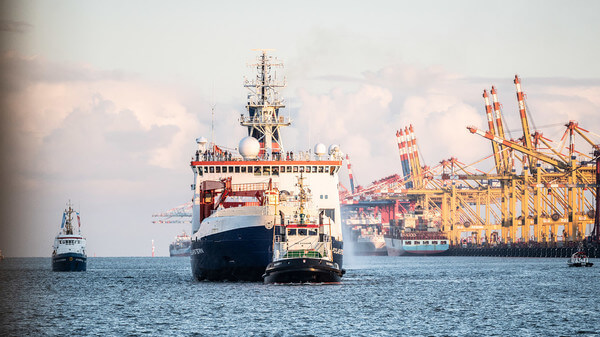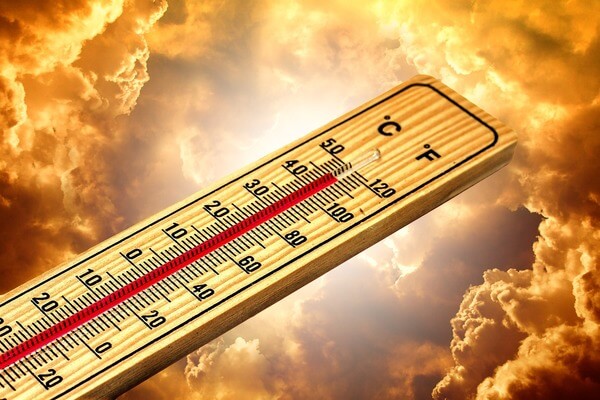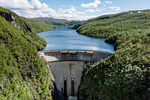News Release from windfair.net
Wind Industry Profile of
Devil-may-care
The Corona pandemic could have ushered in change. Is the global community - by necessity - finally putting a stop to climate change and taking comprehensive measures to prevent one tipping point after another from being passed?
Now, almost 1.5 years after the start of the pandemic, the economy is being rebooted, reconstruction and reboot programmes are underway in many places. But has anything changed? Not really.
If at first it seemed as if climate protection would play a major role, not much of that has remained. The business lobby is getting its way. And the bad news never stop. No sooner does a study appear that highlights the high expansion of renewable energies in recent years than at least one more appears that emphasises that it is still not enough.

Initial research results from the POLARSTERN are worrying (Image: BMBF / Hans-Joachim Rickel)
The research results recently brought back from the Arctic, where the research vessel POLARSTERN drifted on an ice floe for a year and collected huge amounts of data, are worrying. The findings: the climate is even worse than expected, the ice is thinner than ever, temperatures are 10 degrees C too high and, to make matters worse, there is the threat of an ozone hole like the one over the South Pole.
"We have seen how the Arctic ice is doing. Only the evaluation of the next few years will show whether we can still save the year-round Arctic sea ice through consistent climate protection, or whether we have already passed this important tipping point in the climate system. And this can lead to the start of a cascade in the course of which further tipping points are triggered that can drive warming ever further - such as a disappearance of the Greenland ice sheet or the thawing of ever larger areas of Arctic permafrost," warns expedition leader Markus Rex of the Alfred Wegener Institute. However, the fact that such a tipping point is irreparable does not seem to have reached many people yet.
"Much greater resources have to be mobilised and directed to clean energy technologies to put the world on track to reach net-zero emissions by 2050. Based on our new Net Zero Roadmap, clean energy investment will need to triple by 2030," Fatih Birol of the International Energy Agency (IEA) also recently stressed.

"Hot season" soon not only in summer (Image: Pixabay)
Nevertheless, greed for profit still comes first - often supported by governments. Iraq, for example, wants to build eight nuclear reactors by 2030 to cover its electricity needs. Cost? 33 billion euros. Yet the country is suffering from one of the worst economic crises in years. Experts advise investing in the dilapidated infrastructure, through which 30 to 50 percent of energy in the electricity cycle is lost. But despite an agreement between the government and Siemens, none of the planned infrastructure renewal projects worth around eight billion euros have been implemented so far.
Meanwhile, in the North Sea, directly off Borkum and Norderney, a Dutch company wants to produce natural gas on a large scale - wasn't there something about switching to renewable energies? According to German media outlet Zeit, the compatibility of the planned project with international climate protection goals and the impact on the neighbouring Wadden Sea (Unesco World Heritage Site) is still being examined. The effects on the landscape and air quality as well as possible environmental impacts, e.g. from earthquakes, ground subsidence or underwater noise, will probably also be assessed before the project is finally approved. But why is such a project even on the agenda in the middle of Europe, which is considered a pioneer in climate protection and energy transition? Meanwhile, German state governments, are introducing new distance rules for wind turbines in rows. Does that still make any sense?
Sure, because some people want to make a killing with the help of politics before fossil fuels finally come to an end. And it's still working out just fine. According to the Renewables 2021 Global Status Report by REN21, the share of fossil fuels in the energy mix is still as high as it was a decade ago (80.3 % compared to 80.2 % today), while the share of renewable energies has only increased slightly.
"(... We) are far from the necessary paradigm shift towards a cleaner, healthier and more equitable energy future," the study states. "Even with the historic drop in energy consumption in 2020 due to Covid-19, the five G20 countries with renewable energy targets struggled to meet their 2020 goals." The other 15 countries have not even formulated targets to date.
"We are waking up to the bitter reality that the climate policy promises of the last decade have largely been empty words," concludes REN21 Executive Director Rana Adib. "The share of fossil fuels in final energy consumption has not moved an inch."
In Germany, even the country's highest court had to intervene and slap the government on the wrist to finally raise its climate protection targets. Results? Not in this legislative period. A few measures have been initiated, but the new government will have to struggle with the formulation of concrete targets.
That's not how it works!
- Author:
- Katrin Radtke
- Email:
- press@windfair.net
- Keywords:
- climate change, climate protection, fossil, politics, government, renewable energy, natural gas, nuclear, research

























